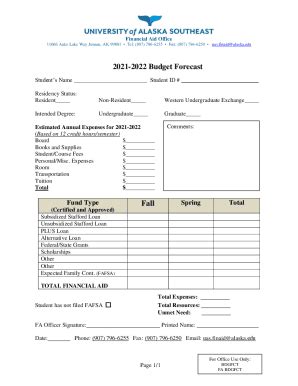Unlocking the financial resources to pursue your academic aspirations at the University of Alaska Southeast (UAS) can seem like an insurmountable task. However, with a comprehensive approach, you can navigate the financial aid landscape and minimize the financial burden of your education.

Types of Financial Aid Available
UAS offers a wide array of financial aid options to cater to the diverse needs of its students:
- Grants: Free money that does not need to be repaid, such as the Federal Pell Grant and the Alaska Performance Scholarship.
- Scholarships: Merit-based awards that recognize academic excellence, leadership, or specific talents.
- Loans: Funds that must be repaid after graduation, including federal student loans and private loans.
- Work-Study: Offers part-time employment opportunities on or off campus, allowing students to earn money and gain valuable work experience.
- Other Assistance: Includes emergency funds, tuition waivers, and other forms of support.
How to Apply for Financial Aid
The process of applying for financial aid begins with completing the Free Application for Federal Student Aid (FAFSA). This application determines your eligibility for federal and state financial aid. You can file the FAFSA online at studentaid.gov.
Deadlines and Important Dates
To ensure timely processing of your financial aid application, it is crucial to adhere to the following deadlines:
- FAFSA Application Deadline: Priority deadline is March 1 for the following academic year.
- Verification: If requested, submit required documentation to verify your financial information.
- Award Notification: UAS will notify you of your financial aid package after your FAFSA has been processed.
Tips for Maximizing Your Financial Aid
- Apply early: The earlier you apply, the higher the likelihood of securing the full range of available aid.
- Submit accurate information on your FAFSA: Any inaccuracies can delay your application or result in ineligibility.
- Explore scholarship opportunities: Research external scholarships from organizations and businesses.
- Consider work-study: Earning while learning can reduce your reliance on loans.
- Utilize financial planning resources: UAS Student Financial Services provides personalized guidance and support.
Understanding the FAFSA
The FAFSA is an essential step in the financial aid process. Here are some key aspects to keep in mind:
- Income information: Report your (and your parents’ if applicable) income from the previous year’s tax return.
- Dependency status: Determine if you are considered dependent or independent by the FAFSA criteria.
- Expected Family Contribution (EFC): The FAFSA calculates your EFC, which represents your family’s ability to contribute to your education.
Financial Aid Myths Debunked
Misconceptions about financial aid can lead to missed opportunities. Debunking these myths is crucial:
- Myth: Financial aid is only for low-income families.
- Fact: Students from all income levels can qualify for financial aid.
- Myth: I have to take out student loans to pay for college.
- Fact: There are many forms of financial aid that do not have to be repaid.
- Myth: Applying for financial aid is complicated and time-consuming.
- Fact: The FAFSA process has been streamlined, and resources are available to assist you.
Why Financial Aid Matters
Financial aid plays a pivotal role in:
- Access to education: Making college affordable for students from all socioeconomic backgrounds.
- Student success: Reducing financial stress and allowing students to focus on their academic goals.
- Economic opportunity: Investing in higher education promotes individual and community prosperity.
How Financial Aid Benefits You
- Reduces financial burden: Offset tuition, housing, and living expenses.
- Opens doors to opportunities: Fund educational experiences, research, and study abroad programs.
- Provides peace of mind: Alleviates financial worries and supports your well-being.
Table 1: Types of Financial Aid at UAS
| Type of Aid | Description |
|---|---|
| Grants | Free money that does not need to be repaid |
| Scholarships | Merit-based awards that recognize academic excellence |
| Loans | Funds that must be repaid after graduation |
| Work-Study | Part-time employment opportunities |
| Other Assistance | Emergency funds, tuition waivers, and other support |
Table 2: Financial Aid Deadlines
| Deadline | Description |
|---|---|
| March 1 | FAFSA Priority Deadline |
| April 10 | UAS Priority Deadline |
| June 1 | Financial Aid Application Deadline |
Table 3: FAFSA Application Components
| Component | Description |
|---|---|
| Income information | Report your income from the previous year’s tax return |
| Dependency status | Determine if you are considered dependent or independent by the FAFSA criteria |
| Expected Family Contribution (EFC) | The FAFSA calculates your EFC, which represents your family’s ability to contribute to your education |
Table 4: Financial Aid Benefits
| Benefit | Description |
|---|---|
| Reduces financial burden | Offset tuition, housing, and living expenses |
| Opens doors to opportunities | Fund educational experiences, research, and study abroad programs |
| Provides peace of mind | Alleviates financial worries and supports your well-being |
Common Mistakes to Avoid
- Missing deadlines: Adhering to the financial aid deadlines is crucial.
- Inaccurate FAFSA information: Ensure that all the information you provide is correct.
- Not considering all aid options: Explore all available grants, scholarships, and work-study programs.
- Ignoring financial planning: Develop a budget and plan for expenses beyond tuition.
- Falling for financial aid scams: Be wary of unsolicited emails or phone calls requesting your financial information.
Conclusion
Navigating the financial aid landscape can be challenging, but with careful planning and a commitment to understanding the available resources, you can unlock the financial means to pursue your academic dreams at the University of Alaska Southeast. Remember, financial aid is not a handout but an investment in your future. Embrace it, utilize it strategically, and pave the way for a successful and fulfilling college experience.
